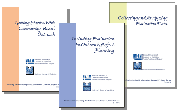Imholz S, Arns JW. Worth Their Weight: An Assessment of the Evolving Field of Library Valuation. New York: Americans for Libraries Council, 2007.
“Worth Their Weight” takes stock of the field of library valuation, defined as the process of assessing the value of a library to its community in actual dollars and cents. The report was issued by Americans for Libraries Council (ALC), “a nonprofit organization dedicated to increasing innovation and investment in the nation’s libraries.” The report describes different valuation models adapted from business and the nonprofit sector, such as social return-on-investment, triple-bottom line accounting, corporate social responsibility reports, and the balanced scorecard. To provide an overview of the valuation field, the report includes summaries of 17 public library valuation and impact studies (with links to the full reports). These summaries include detailed descriptions of the methods used, including actual surveys employed by the libraries. Finally, the report suggests ways to build the field of valuation and apply findings for use in library advocacy. The report relates specifically to public libraries, but the information has applicability to hospital and health science library valuation.




